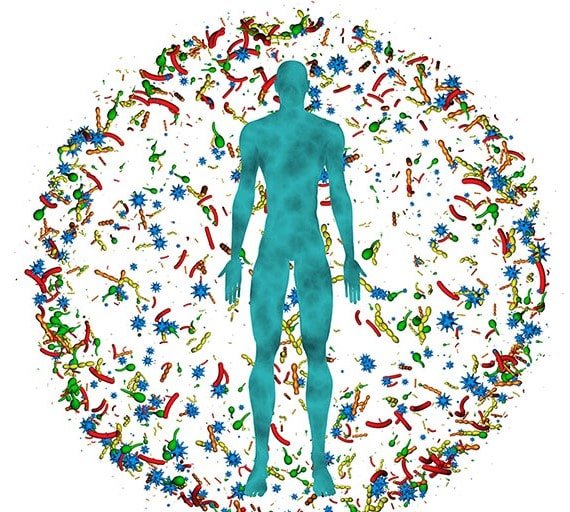In recent years, there has been a growing appreciation for the role of the microbiome in human health. The microbiome, consisting of trillions of microorganisms residing primarily in the gut, plays a crucial role in various physiological processes, including digestion, immune function, and metabolism. One area of particular interest is its impact on chronic inflammation-related diseases. Chronic inflammation is increasingly recognized as a key factor in the development and progression of various conditions, including autoimmune disorders, metabolic syndrome, and cardiovascular diseases. In this blog post, we’ll delve into the intricate relationship between the microbiome and chronic inflammation, exploring how disruptions in microbial balance can contribute to disease pathogenesis and potential therapeutic interventions.

Understanding the Microbiome:
Before delving into the link between the microbiome and chronic inflammation-related diseases, it’s essential to understand what the microbiome is and how it functions. The human microbiome comprises a diverse array of bacteria, viruses, fungi, and other microorganisms that inhabit various parts of the body, with the largest concentration found in the gastrointestinal tract. These microbes form a complex ecosystem that interacts with the host in numerous ways, influencing nutrient metabolism, immune responses, and even behavior.
The Gut Microbiome and Chronic Inflammation:
The gut microbiome, in particular, has garnered significant attention due to its role in regulating immune function and inflammation. Emerging research suggests that alterations in the composition and diversity of gut microbes, known as dysbiosis, can contribute to chronic inflammation and the development of inflammatory diseases.
One mechanism through which the gut microbiome influences inflammation is through the production of metabolites and signaling molecules. Certain gut bacteria produce short-chain fatty acids (SCFAs), such as butyrate, acetate, and propionate, through the fermentation of dietary fiber. SCFAs have anti-inflammatory properties and help maintain intestinal barrier function, thereby reducing the translocation of pro-inflammatory molecules into the bloodstream.
Additionally, the gut microbiome interacts with the host immune system, modulating immune responses and inflammation. Commensal bacteria play a crucial role in educating the immune system and promoting immune tolerance, thereby preventing inappropriate inflammatory reactions. Disruptions in this delicate balance can lead to immune dysregulation and chronic inflammation.
The Role of Chronic Inflammation in Disease:
Chronic inflammation is a hallmark feature of many diseases, including autoimmune disorders, metabolic syndrome, neurodegenerative diseases, and cardiovascular diseases. Inflammation is the body’s natural response to infection, injury, or stress, characterized by the release of pro-inflammatory cytokines and activation of immune cells. However, when inflammation becomes chronic and dysregulated, it can contribute to tissue damage, organ dysfunction, and the progression of disease.
Autoimmune disorders, such as rheumatoid arthritis, inflammatory bowel disease (IBD), and multiple sclerosis, result from an overactive immune response targeting the body’s tissues. Dysbiosis in the gut microbiome has been implicated in triggering and exacerbating autoimmune conditions by promoting immune dysregulation and inflammation.
Metabolic syndrome, characterized by obesity, insulin resistance, hypertension, and dyslipidemia, is closely linked to chronic low-grade inflammation. Adipose tissue, particularly visceral fat, secretes pro-inflammatory cytokines and chemokines, leading to systemic inflammation and insulin resistance. Emerging evidence suggests that alterations in the gut microbiome composition, often associated with high-fat diets and sedentary lifestyles, may contribute to metabolic dysfunction and inflammation.
Neuroinflammation is increasingly recognized as a contributing factor in neurodegenerative diseases, such as Alzheimer’s disease and Parkinson’s disease. The gut-brain axis, a bidirectional communication network between the gut and the central nervous system, plays a crucial role in regulating inflammation and neuronal function. Disruptions in the gut microbiome composition, as observed in conditions like dysbiosis or leaky gut syndrome, may contribute to neuroinflammation and cognitive decline.
Cardiovascular diseases, including atherosclerosis, hypertension, and heart failure, are characterized by chronic inflammation within the vascular wall. Endothelial dysfunction, oxidative stress, and immune cell activation contribute to the development and progression of atherosclerotic plaques. The gut microbiome has been implicated in modulating cardiovascular risk factors, such as lipid metabolism, blood pressure regulation, and systemic inflammation.
Therapeutic Interventions Targeting the Microbiome:
Given the intricate relationship between the microbiome and chronic inflammation-related diseases, there is growing interest in developing therapeutic interventions aimed at modulating the gut microbiome to improve health outcomes. Several approaches have shown promise in preclinical and clinical studies:
- Probiotics and Prebiotics: Probiotics are live microorganisms that confer health benefits when consumed in adequate amounts. Prebiotics are non-digestible fibers that promote the growth of beneficial bacteria in the gut. Both probiotics and prebiotics have been shown to modulate the composition of the gut microbiome and reduce inflammation in various disease settings.
- Dietary Modifications: Diet plays a significant role in shaping the gut microbiome composition and function. A diet rich in fiber, fruits, vegetables, and fermented foods promotes microbial diversity and SCFA production, which may help alleviate inflammation. Conversely, a Western-style diet high in saturated fats, sugar, and processed foods is associated with dysbiosis and increased inflammatory markers.
- Fecal Microbiota Transplantation (FMT): FMT involves transferring fecal material from a healthy donor to a recipient with a dysbiotic gut microbiome. FMT has shown remarkable efficacy in treating recurrent Clostridioides difficile infection and is being investigated as a potential therapy for other inflammatory conditions.
- Microbiota-targeted Therapies: Emerging strategies aim to directly target the gut microbiome using engineered bacteria, bacteriophages, or microbial metabolites. These microbiota-targeted therapies have the potential to modulate the microbiome in a more precise and personalized manner, offering new avenues for therapeutic intervention.
Conclusion:
The microbiome plays a critical role in regulating immune function and inflammation, with disruptions in microbial balance implicated in the pathogenesis of chronic inflammation-related diseases. Understanding the complex interactions between the microbiome, immune system, and host physiology is essential for developing effective strategies to prevent and treat these conditions. Therapeutic interventions targeting the gut microbiome hold promise for modulating inflammation and improving health outcomes in individuals with chronic inflammatory diseases. As research in this field continues to evolve, harnessing the therapeutic potential of the microbiome may pave the way for personalized medicine approaches to address the underlying drivers of inflammation and promote optimal health and well-being.




